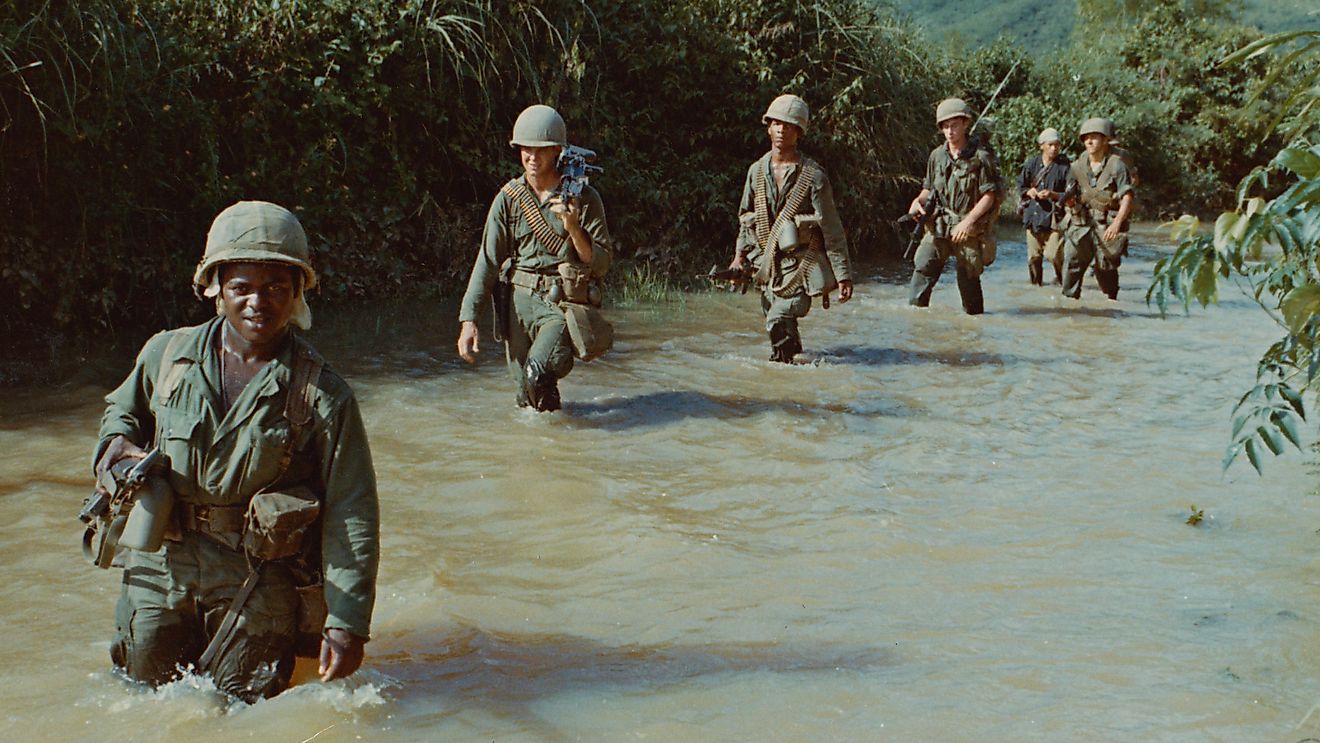How Many Americans Were Killed In The Vietnam War?

- The Vietnam War was a long, deadly struggle that took place from 1954 to 1975 between North Vietnam and South Vietnam
- The U.S. National Archives shows that 58,220 U.S. soldiers perished.
- North Vietnamese troops launched the Tet Offensive in January 1968, which was successful against South Vietnam and the U.S.
The Vietnam War was a long, deadly struggle that took place from 1954 to 1975 between North Vietnam and South Vietnam. The two governments were pitted against each other in a war that was part of the larger Indochina Wars. Communist North Vietnam and its allies fought against South Vietnam (the Viet Cong) and its allies, including the United States. It was also called the “American War in Vietnam,” and marked the clash between Communism the Democratic Western World.
Beginnings
After China became a communist nation, fears of communism spreading to other countries became very real. Communism developed in Vietnam, splitting the country into its South and North. In 1954, North Vietnam defeated French colonial rule and tried to unify the whole country under one communist regime.
The South Vietnamese government fought to preserve democratic values. United States military advisers brought in active combat units in 1965; four years later, more than 500,000 U.S. troops were stationed there. At the same time, China and the Soviet Union were gathering leaders, combat troops, supplies, and weapons in the north.
The Human Costs

Like all wars, this long conflict led to a tragic loss of life. In 1995, Vietnam released its official estimate of fatalities. They included about two million civilians on both sides of the conflict, along with 1.1 million Viet Cong and North Vietnamese fighters. The U.S. Military estimated that approximately 200,000 to 250,000 South Vietnamese perished in the Vietnam War.
Although the records may not be complete, the U.S. National Archives shows that 58,220 U.S. soldiers perished, and categorized the deaths as follows. These numbers are not official statistics and are for informational purposes only.
Casualty Category Number of Records
Killed in action 40,934
Died of wounds 5,299
Accident 9,107
Declared dead 1,201
Illness 938
Self-inflicted 382
Homicide 236
Presumed Dead (Body remains not recovered) 91
Presumed Dead (Body was recovered) 32
More Data
During the Vietnam War, there were hardly any females placed on active duty. Out of the 58,220 soldiers, just eight were women. As for the different branches, 38,224 were in the Army, 14,844 were in the Marine Corps, 2,586 in the Air Force, 2,559 in the Navy, and seven from the Coast Guard.
Counts by Race
White 49,830
Black or African American 7,243
American Indian/Alaskan Native 226
Hispanic One Race 349
Native Hawaiian/Pacific Island 229
Non-Hispanic/More than One Race 204
Asian 139
Other Conflicts
Looking at other wars that the U.S. was involved in, the loss of life during Vietnam falls somewhere around the middle.
Civil War: 498,332
World War II: 291,557
Vietnam War: 58,220
World War I: 53,402
Korean War: 36,574
Some have pointed out that the number of lives lost in the Vietnam War has been surpassed by fatalities from COVID-19. As of June 8, 2020, the CDC shows this latter number at 92,922.
Vietnam War Protests

After the United States joined the Vietnam War, small protests began on college campuses and other areas. Once the U.S. started heavily bombing North Vietnam in 1965 though, more demonstrations were organized, including the one by Students for a Democratic Society (SDS). By November 1967, the number of American troops in Vietnam was around 500,000; there were 109,527 wounded and 15,058 deaths.
On October 21, 1967, one of the best-know anti-war protests took place at the Lincoln Memorial in Washington, DC, with about 100,000 in attendance. About a third of them marched on the Pentagon that night. There was a violent confrontation with demonstrators and U.S. Marshals; hundreds were arrested as they tried to storm the building. That same year, civil rights leader Martin Luther King, Jr. publicly opposed the war on moral grounds. MLK also led a march in Chicago on March 25, calling the war “a blasphemy against all that America stands for.”
North Vietnamese troops launched the Tet Offensive in January 1968, which was successful against South Vietnam and the U.S. The home front in the U.S. was shocked, and the strongest period of anti-war protests began. Members from the Vietnam Veterans Against the War organization participated, many on crutches or in wheelchairs. This persuaded many to join the anti-war cause.
The Final Ending

Though many Americans were strongly opposed to this war, things did not really change until January 1973, when President Nixon announced the end to U.S. involvement. On January 27, 1973, the Paris Peace Agreement was signed. The war did not officially end until July 2, 1976, though. South Vietnam had surrendered, and North Vietnam came in to occupy Saigon and institute their military government. The country was renamed as the Socialist Republic of Vietnam, with the new capital in Hanoi.











